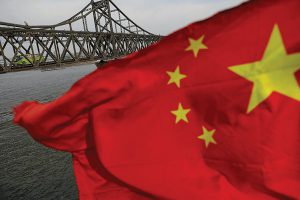Bloomberg
China is stepping up efforts to ease broad public anger over a mother of eight children who was found chained by the neck in a shack after local authorities were accused of downplaying the matter.
The government of the eastern province of Jiangsu is
forming a team to “find the truth, punish those who violated laws, hold those involved accountable and release the
results to the public in a timely manner,†state broadcaster China Central Television said in a brief statement on one of its social media accounts.
One social media account run by the People’s Daily, the Communist Party’s flagship newspaper, offered assurances that the inquiry would be effective, saying: “The truth will eventually surface!†A newspaper published by All-China Women’s Federation said in a social media post that the decision
by Jiangsu authorities would “respond to public concerns.â€
The inquiry and assurances by some of the biggest state media outlets in the nation of 1.4 billion people are sign that President Xi Jinping’s government is coming under greater pressure to resolve the scandal, which threatens to overshadow the Beijing Winter Olympics. The woman’s plight has simmered since a video appeared in late January, then circulated over the weeklong Lunar New Year holiday.
The topic was again one of the most-read threads on
the Twitter-like Weibo social media platform, attracting hundreds of millions of views. While many people said they were encouraged that their calls for a closer look were being heard, some warned that local authorities might hinder a probe.
“Can I trust the results of an investigation conducted on oneself?†one Weibo user asked.
Much of the public anger has been directed at officials in Xuzhou, the third-largest city in the rich coastal province of Jiangsu that borders the financial hub of Shanghai. Their early statements seemed to downplay the plight of the woman living in the rural village of Dongji and at times they seemed to contradict each other.
One of the four statements said no human trafficking was involved even though two
people were later detained on suspicion of committing that crime.
Officials had said a friend brought the woman surnamed Yang who suffered from speech abnormalities and schizophrenia to Jiangsu from the southwestern province of Yunnan years ago for medical treatment and to find a “good family to marry.†She got separated from the person and married her husband in 1998, they added.
Last week, police detained the woman’s 55-year-old husband on suspicion of unlawful imprisonment. Official statements have not provided Yang’s age. Authorities also haven’t provided ages for the couple’s children, though social media posts speculate they range in age from two to 23.
Beijing-based Caixin Global has raised questions about Yang’s real identity, citing research by a former investigative journalist who says a photo on her marriage certificate doesn’t seem to match images of the woman seen in videos. Caixin has also reported that a second woman in the same village lived in similar circumstance as Yang, pointing to a video that appeared on social media that is no longer online.
Earlier this week, China censored a letter signed by 100 alumni of Peking University calling for the central government to look into the matter, a rare public challenge to the government.
The letter disappeared from Chinese social media, shortly after it was posted. Attempts to open it on the social media app led to a page reading: “Unable to view this content because it violates regulations.â€
 The Gulf Time Newspaper One of the finest business newspapers in the UAE brought to you by our professional writers and editors.
The Gulf Time Newspaper One of the finest business newspapers in the UAE brought to you by our professional writers and editors.
